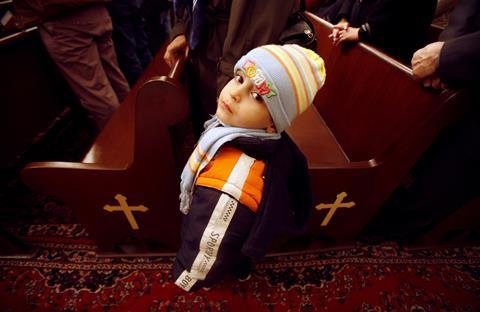A new report says life for Christians in Iran is harder than ever. Ben Cohen says their horrific treatment at the hands of the Morality Police reminds him of George Orwell’s famous dystopian novel

On 16 September 2022, 22-year-old Iranian woman Mahsa Amini died in a Tehran hospital. Iran’s Morality Police had arrested her for wearing her hijab incorrectly. The official version of events was that she died of a heart attack in custody. Witnesses to her detention suggest she died from a brutal beating by police – a finding echoed by a UN factfinding mission into the death.
I’m sure you will have seen footage of thousands taking to the streets in protest – it started within hours of her death. It’s hard to gauge the total number that demonstrated, but an estimated 20,000 were detained and over 550 killed – in part due to security forces firing live rounds of ammunition at the protestors.
Along with several media commentators, I wondered if Iran’s theocratic totalitarian government could survive the public outcry. Yet, 18 months later, they are still very much in place, their vice-like grip on power even tighter and more ruthless.
Reading Open Doors’ latest report into life for Iran’s Christian minority (produced in partnership with CSW, Middle East Concern and Article18), I began to get a sense of how this is possible. The ruthless treatment of anyone who is seen as a threat to the Islamic Republic shocked me to the core. It reminded me of a book I was introduced to in my English class at school: George Orwell’s 1984 (Penguin Modern Classics).
First published in 1948, Orwell’s dystopian novel describes a fictional London, ruled over by an anonymous elite who control every aspect of a person’s life, including the thoughts they can think and the words they are allowed to use.
The term “Orwellian” is rather over-used for anything considered a little too intrusive or heavy-handed. However, reading the report, the parallels leaped out at me. It left me wondering if Orwell (real name Eric Blair) might have worried he had, if anything, understated the evil possibilities of totalitarianism.
Here are four ways that life for persecuted Christians comes uncomfortably close to Orwell’s dystopian vision.
1. High tech surveillance and privacy invasion
Digital surveillance is a growth industry among autocratic regimes – China is the market leader and Iran is one of several nations putting the technology to use. In 1984, it is the ubiquitous two-way telescreens. In Iran it is more likely to be spyware slipped onto your phone. Christians brought in for interrogation see print offs of their screen grabs, WhatsApp conversations, photographs and emails – their whole life laid bare.
Elsewhere, the surveillance is less subtle and used to directly intimidate. Touraj Shirani, an Iranian Christian convert, said of one such experience: “We were talking once when one of my daughters asked, sadly: ‘Why won’t they just leave us alone?’ That very moment, the Ministry of Intelligence called us and said: ‘Shut up!’”
2. Extreme pressure to recant undesirable ideas and beliefs
In 1984 you could only have one love: for “Big Brother”, a personification of the fictional Oceana’s faceless rulers. For Christian converts in Iran, loving Jesus over the state’s strict form of Shi’a Islam is not an option. They face lengthy Islamic “re-education” sessions.
Convert, Mojtaba Keshavarz Ahmadi, recalls: “My interrogators told me frankly and boldly: ‘You have no rights and no choice because your religion has already been chosen for you.”
Another believer, Ali Kazemian, says: “In addition to this physical torture…they threatened me that: ‘We’ll harm your wife and children…We’ll bring your wife to the interrogation room and strip her naked in front of everyone, to see if you can really resist and stay quiet!’”
3. Encouragement for citizens to spy and inform on each other
In 1984, Smith develops a friendship with O’Brien, who is secretly part of the Thought Police and goes on to betray and arrest him. Similarly, secret informants are ubiquitous in Iran. Believers seen as useful are offered a salary to remain within the Christian community and report its goings-on to Iran’s Ministry of Intelligence.
Iman Shahvari, a Christian convert, said in a witness statement: “They asked me to cooperate…and said: ‘We can provide jobs for you’. When I refused, I was told: ‘You are poison to Iran! If you stay in Iran, we’ll kill you secretly.’”
4. Control of language
In 1984, a whole new language, called Newspeak, is introduced. As Smith’s colleague Syme explains: “‘Don’t you see that the whole aim of Newspeak is to narrow the range of thought? In the end we shall make thoughtcrime literally impossible, because there will be no words in which to express it.’”
There is no replacement language in Iran. However Christian ideas, worship and teaching are banned in Persian. Armenians, Assyrians and a small expatriate community can generally practice their faith, but nothing can be written, preached or sung in Iran’s native language.
A glimmer of hope
There is one glimmer of hope amid all of this.
During interrogation or re-education sessions, Islamic scholars - or even family members - are brought in to persuade Christian ‘apostates’ to return to Islam as interpreted by the theocratic state. As Smith is told in 1984: “You must love Big Brother. It is not enough to obey him; you must love him.”
However, for thousands of Christians across Iran, even the most brutal and devious surveillance and interrogation can’t erase their one true love.
One convert, Parham Mohammadpour, explained: “During the fourth interrogation…they brought an Islamic cleric to convert me to Islam. But, at the end, I told the interrogators: ‘Even if you cut me into pieces, I won’t abandon my faith in Jesus Christ’”.
We need to be praying for our Christian brothers and sisters, that their love and boldness can never be erased.





































No comments yet